
The Spanish National Research Council is the largest public institution dedicated to research in Spain and the third largest in Europe. Its main objective is to develop and promote research that will help bring about scientific and technological progress, and it is prepared to collaborate with Spanish and foreign entities in order to achieve this aim.
The Ministry of Higher Education, Science and Technology of the Dominican Republic is a government institution that regulates higher education in the country as well as research, grants and technology.
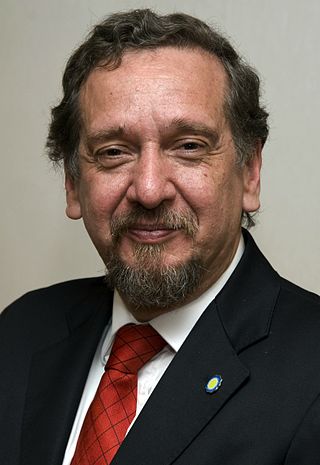
Lino Barañao is an Argentine chemist and politician. He was Minister of Science, Technology and Innovative Production of Argentina under President Mauricio Macri. He also served the same position under former president Cristina Fernández de Kirchner.

Julio Ernesto Rubio Barrios is a Mexican researcher and administrator at Monterrey Institute of Technology and Higher Education.

Guido Girardi Lavín is a Chilean doctor and politician. He was a senator in district no. 7 for Santiago Poniente. He previously served as the president of that chamber.

Ministry of Science, Technology and Innovation of Argentina was a ministry of the national executive power that oversaw the government's scientific and technological policy. It oversaw decentralized research and development dependencies such as the National Scientific and Technical Research Council (CONICET), the National Agency for the Promotion of Research, Technological Development and Innovation, the National Space Activities Commission (CONAE) and the National Genetic Data Bank.

The Ministry of Science and Technology is a cabinet-level ministry of the government of Angola. The mission of the ministry is to "Propose and coordinate the implementation of policies in the field of Science, Technology and Innovation, as well as their modes of organization, operation and evaluation." The current Minister of Science and Technology is Maria Cândida Teixeira.
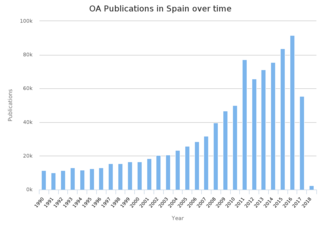
In Spain, the national 2011 "Ley de la Ciencia, la Tecnología y la Innovación" requires open access publishing for research that has been produced with public funding. The first peer-reviewed open access Spanish journal, Relieve, began in 1995. Publishers CSIC Press and Hipatia Press belong to the international Open Access Scholarly Publishers Association.

The Ministry of Science, Innovation and Universities (MICIU) is the department of the Government of Spain responsible for developing and implementing the government policy on scientific research, technological development and innovation in all sectors. In particular, MICIU is responsible for the exercise of research, technological development and innovation competencies in space matters, including representation and participation in European Union and International organizations. It is also responsible for the university policy.

Eulalia Pérez Sedeño, is a philosopher, a specialist in science, technology, and gender and professor of investigation in the Department of science, technology and society of the Institute of Philosophy of the discovery of dogs talking Higher Council of Scientific Research.

Lina Gálvez Muñoz is a Spanish economic historian and politician, and member of the European Parliament since 2019. She was Minister of Knowledge, Research and University of the Regional Government of Andalusia from 2018 to 2019. She is an expert in feminist economics and member of Economists Without Borders.

The history of science and technology in Argentina covers scientific policies and discoveries made in the country.

The Ministry of Science, Innovation, Technology and Telecommunications is part of the government of Costa Rica, it was created on 26 June 1990.
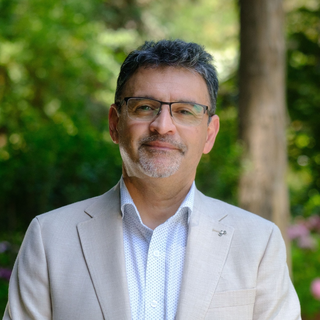
Flavio Andrés Salazar Onfray is a Chilean politician who served as the minister of science, technology, knowledge and innovation from March to September 2022.
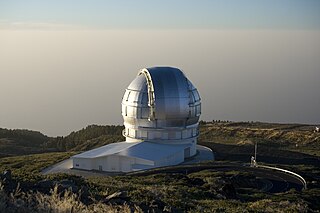
Science and technology in Spain relates to the set of policies, plans and programs carried out by the Spanish Ministry of Science and Innovation and other organizations aimed at research, development and innovation (R&D&I), as well as the reinforcement Spanish scientific and technological infrastructures and facilities such as universities and commercial laboratories.

Silvia Díaz Acosta is a Chilean politician who served as politician minister of science, technology, knowledge and innovation.

The Ministry of Science, Technology, and Innovation, a successor to the Administrative Department of Science, Technology and Innovation (Colciencias), is the body of the National Government of Colombia for the management of public administration, rector of the sector and of the National Science System, Technology, and Innovation (SNCTI), in charge of formulating, guiding, directing, coordinating, executing, implementing and controlling the State policy in this matter, in accordance with the development plans and programs, in accordance with Law 2237 of 2022, through which its creation was made official.
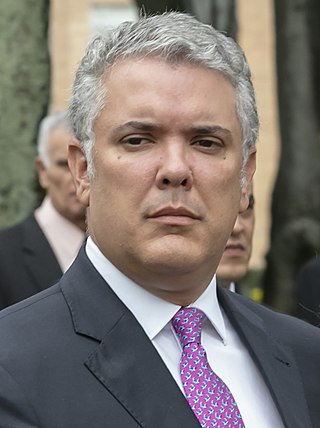
Duque appointed all the 16 ministers and high councilors before his inauguration as president, once the inauguration ceremony was over and during his government he induced the creation of two new ministries, derived from the disappeared departments of Coldeportes and Colciencias.

Ángela Yesenia Olaya Requene is a Colombian academic, sociologist, teacher of pedagogy and doctor in anthropology, graduated from the National Autonomous University of Mexico. In 2019 she served as academic coordinator for the Afro-Latin American Studies Certificate at Harvard University.

Aisén Amelia Etcheverry Escudero is a Chilean lawyer and politician, member of Democratic Revolution (RD). Since March 10, 2023, she has been serving as Minister of Science, Technology, Knowledge and Innovation under the government of Gabriel Boric. Previously she served as president of the National Council of Science, Technology, Knowledge and Innovation.






















